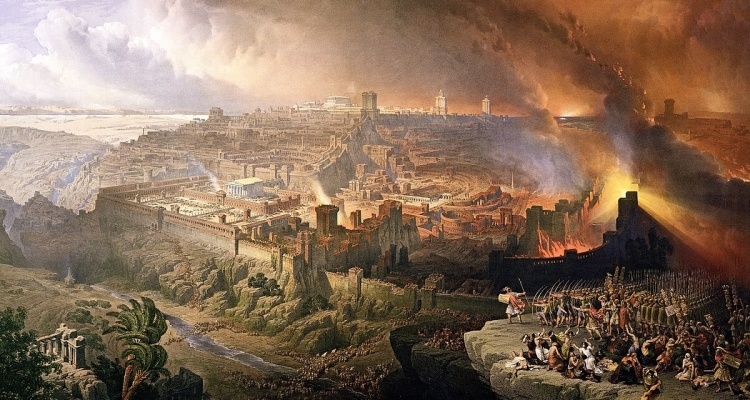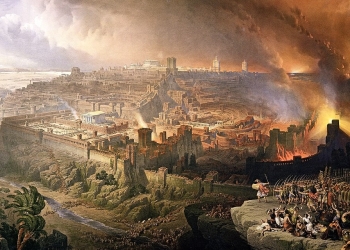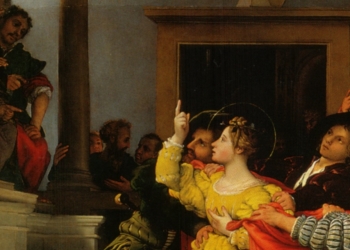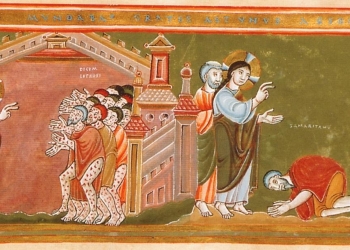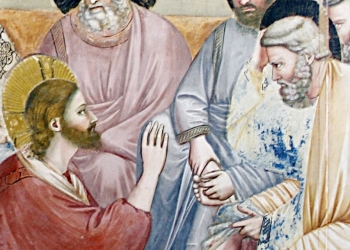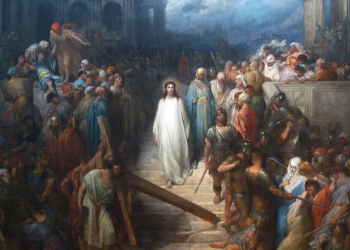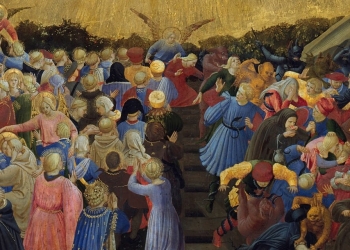16 Novembre 2025
XXXIII Sunday of Ordinary Time, C
The Gospel passage of today (Lk 21:5–19) is taken from chapter 21 of Luke, which recounts the so-called “eschatological discourse” of Jesus.
It all begins with a gaze — that of “some people” who speak admiringly of the beauty of the Temple and its ornaments (Lk 21:5).
And yet, of all this that they look upon with admiration, nothing will remain (Lk 21:6).
Jesus announces this, fully aware of the symbolic importance of that building: it was the heart of the people’s faith, the symbol of a nation and a religion.
The Temple will collapse, and with it a whole world will collapse — a religiosity, an era.
But Jesus continues his reflection and announces that there is something which, unlike the Temple, despite the great trials it will have to endure, will not pass away.
The trials are indeed countless and of every kind.
Jesus lists them in an impressive way, such that it seems it will be very difficult to endure: wars and revolutions, uprisings, earthquakes, famines and plagues, terrifying events and great signs in the sky; not to mention persecutions, hatred and betrayals, even by one’s own friends and family members (Lk 21:9–17). Everything that could possibly go wrong.
It seems impossible to remain steadfast amid such turmoil. And yet, no.
The Temple, with all its grandeur, is destined to fall.
But not a single hair from the head of the disciples will be lost (Lk 21:18).
What does this mean?
It certainly does not mean that the disciples will always be safe, or that evil will have no power over them. In verse 16, in fact, Jesus clearly says that some, betrayed even by their own relatives, will be killed.
Rather, it means that all this will not be the end.
It will not be the end of life, nor of faith, nor of hope. It means there is something beyond — that from there, something new can be born.
And how will all this be possible? The Gospel passage offers three answers.
The first is that those who trust in the Lord will know a new beginning — those who believe that the Lord has not abandoned this history, and has not failed in his promise.
Those who believe that the Lord is especially close to those who suffer and are persecuted, and that He is there to inspire new words and a wisdom different from mere human wisdom (Lk 21:15).
Then, those who will endure are those who have a different way of looking at life.
At the beginning, we found some who stopped to admire the beautiful stones of the Temple; but as the passage continues, we find other ways of seeing.
There is the gaze of those who are not deceived, who do not follow whoever claims to be the Lord (21:8); in other words, those who have learned to know Him through His Paschal traits, and do not confuse Him with anyone else.
And there is the gaze of those who see, within all the upheavals described, an unexpected new possibility — that of giving witness (Lk 21:13).
It is interesting that Jesus does not say of what or of whom this witness must be given.
Because it is about bearing witness precisely to this: to the possibility of not succumbing to fear, and of always beginning anew.
Finally, those who persevere will endure (Lk 21:19) — that is, those who do not flee from life with all its complexity, its trials, and its dramas, but who in everything see the possibility that, by persevering, their life will be saved.
Indeed, life is saved when it is given out of love.
A life given out of love can also encounter death, as the Lord Jesus did.
But it is a saved life, a life that never ends, that never fails, and that does not suffer the same fate as the temple, of which not a stone remains upon another.
On the contrary, a life completely lost out of love is the highest testimony.
This life is worthy of being contemplated with admiration, as something that endures, something from which even death cannot take anything.
+Pierbattista
*Translated by the Media Office of the Latin Patriarchate

